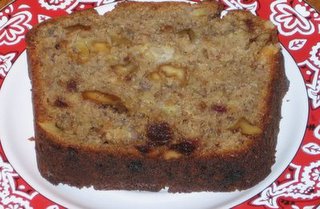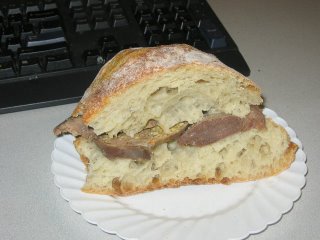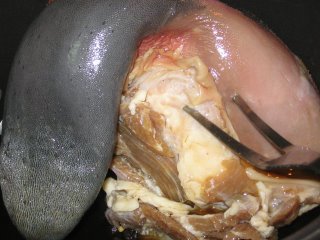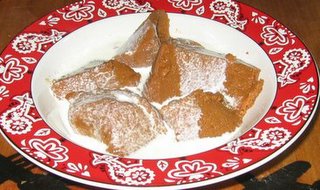Hello, everyone. I'm back.
Where have I been? You might well ask; I haven't posted in almost two weeks. Unfortunately, I haven't been, say, on a trip to Paris. I've just been here, nursing a serious case of the holiday blues.
So the post of all the baking I did over Christmas? There won't be one. Because I didn't. For the first year in recent memory, I didn't bake cookies for my co-workers; I didn't make marmalade or jam for gift baskets; I didn't get together with my best friend to make candies; I didn't make a Yule log. I bowed out of Christmas this year. Partly because I have a touch of SAD. Partly because I'm starting school in a month and I'm nervous about it. Partly because I wasn't looking forward to this Christmas.
(Warning: what follows is deeply self-indulgent, rambling, disorganized, and probably dead-boring to anyone but me. Proceed at your own risk.)
My whole family got together for Thanksgiving: my sister from Albany with her husband and three kids, my brother from Montreal with his best buddy from college, my other single sister who lives near here, and my parents. There were two types of stuffing, the turkey of course, a multitude of vegetables, and a full dessert table. With the whole family there, it seemed worthwhile to spend days ahead prepping for the big event.
But my brother wasn't coming for Christmas, nor my married sister and her family. Christmas this year was my parents, my sister and me. My mom and her two spinster daughters. God help us all.
It was a small Christmas. But it wasn't just that that kept me from having the Christmas spirit.
I love my parents. But I don't exactly get along with them very well. We don't fight, but we aren't close either. So holidays that consist of just them and me and sis; well, they're not fun. We spend a lot of time skirting nervously any topics on which our differences of opinion might become obvious - politics, religion, culture, television, and, yes, since this is a food blog, I might as well talk about it: food.
Food is a much more loaded topic than we usually consider it to be. I mean, if you're stuck with a group of people you don't know, talking about food seems a pretty safe bet. You can talk to almost anyone about which are the best ice cream parlors in your city, or where to find great pizza, or what your family always has for Christmas Eve dinner.
But we define ourselves by what we eat, and we read meaning into other people's choices as well. When I bring my grass-fed organic beef to my parent's house to roast for Christmas dinner, I am bringing my own associations - connections to local farmers, traditional British Christmas feasts of roast and Yorkshire pudding, festive holiday indulgence in fine food. But I also carry associations I don't intend: snobbery, rejection of the turkey dinners of my childhood, prodigal extravagance. And when my mother puts her grocery-store whoopie pies on the dessert table, she intends to show indulgence, a bit of holiday frivolity, and what do I see? Transfats, preservatives, and a greasy mouthfeel.
We're not terrible people. We take each other's offering in the spirit in which it is intended: my mother praises the roast, I eat a Whoopie pie and reminisce about my brother's fondness for them when he was a child. But we notice the gap between us, the lack of connection where it seems like connection should be easiest, the effort we are each making shows, and it seems to sadden us both.
Simple matters of taste resound with significance, even when they shouldn't. If you don't believe, try a simple experiment. Ask someone what sort of person they would imagine would order the following flavors of ice cream: vanilla, dark chocolate, hazelnut, chai, Grapenuts. I'm guessing the answers will go something like this, depending on the respondents' own preferences : dependable (boring), sensual (dramatic, self-indulgent), sophisticated (pretentious), edgy (ostentatious), old-fashioned (old).
Now, these sort of judgments are the type of thing maturity should get us beyond. I can't tell anything about the sort of person you are from whether you prefer venison or chicken, and I'm not going to start ordering chai ice cream when I really want chocolate chip just so I won't feel boring. These differences are shallow, and food-lovers are the worst offenders when it comes to putting too much weight on them. Taste-preferences are meaningless.
But taste isn't the only way we define ourselves by food. There are also ethnic connections, restaurant vs. homecooked, fancy bakery versus supermarket, and so on. Most of these are as frivolous as ice-cream choices - people who love Italian food are not more in touch with their feelings than people who would rather corned beef and potatoes. But some differences do have more significance.
Organic food matters to me because I believe we are poisoning our planet with pesticides. Sustainable food matters to me because I believe that organic isn't enough to ensure a healthy environmental future. Local food matters to me because I believe it helps to support community, the environment and the local economy. Pastured meat matters to me because I believe it is morally wrong to confine animals for the whole of their lives and because I believe that grass-fed meat feeds our bodies better than grain-fed meat. These are moral beliefs, things that get to the core of what I care about: finding a healing way to live in a society that is, in my mind, very ill.
This point of view is so far from my parent's as to be completely alien.
I am not judging them in this. Their generation (they turn 70 this year) was not raised to think about consumer choices as moral choices. There is only one virtue they understand in regards to purchases, and that is frugality. Morality, to them, is primarily a question of being honest, being chaste if unmarried, and having faith. My parents are very good people - they give to the poor, my mother visits shut-ins, my father volunteers his services at a nursing home. I am in no way as generous with my time as they are. They do service work that I admire greatly. They would consider the idea of doing good by spending money on oneself to be absurdly frivolous.
And they would be right. I make no sacrifice in buying fantastic beef. I get enormous pleasure out of going to farmers' markets. I don't want to be the holier-than-thou Whole Foods customer: given the price of much organic food, being able to buy it is a sign of a financial security many can only dream of having.
And yet, and yet....I still believe that Big Agriculture, factory farms, and junk food harm not just the bodies, but the soul of my country. I have stopped trying to communicate this idea to my family; they can't help but understand my interest in these foods in terms they can understand, and unfortunately in those terms local, sustainably-grown food is simply overpriced, a personal indulgence that hints at fiscal irresponsibility (a sin mostly ignored in our credit-card-mad days, but one that is nonetheless at the heart of much misery in this world).
If this attitude were a personal quirk of my parents, this blog entry would simply be its own display of personal indulgence, just me trying to work out the issues between myself and my family in a public forum. And, um, well, it probably is just that. And I should probably be embarrassed. But I know that my parents are more like most Americans than I am. In many ways, this is the defining problem of the sustainable food movement: how do we convince people that sustainable agriculture is a necessity, not a luxury? I don't really know how.
Okay, I've come a long way from my Christmas blues. I don't want to leave anyone with the impression that my views on sustainable farming ruined my Christmas, because that would be completely skewed. But you start thinking about one thing, and it leads to another...As for the other issues...well, let's just say the War on Christmas found its way to our festivities this year, and there were representatives of both armies. Sigh.
Had enough of my personal issues? Good, me too.
The rib roast was fantastic, particularly the gravy, which I made from red wine, pan drippings, onions and roux. The Yorkshire pudding puffed less than usual (pan not hot enough?), but was still crisp on the outside and soft on the inside. I did make two batches of cookies: chewy walnut for my nut-loving mother, and snickerdoodles for my sister. The food was good. Even the Whoopie pies.
And now I'm home. I've got beef stock simmering on the stove, which soothes me to no end. Tomorrow, my boyfriend will get home form his mother's. We'll eat soup and salad and a pasta with nice ragu sauce. And I'll have lived through another Christmas. God bless us every one.
(I'll make yet another confession - I've gone back and forth on posting this for hours. I've got too much Anglo/Celtic blood to feel comfortable talking about personal things without the benefit of a few glasses of whiskey. But I'm trying to overcome my reticence. After all, how many entries about last night's dinner are you poor people supposed to take?)
 I hate to talk trash, but my banana bread is the best in the world. Really. Now, you may be thinking, "Hey, MY banana bread is pretty damned good!" And I'm sure it is. It may be an excellent banana bread, but since mine is, objectively speaking, the best possible banana bread, it only stands to reason that all other banana breads are, tragically, inferior.
I hate to talk trash, but my banana bread is the best in the world. Really. Now, you may be thinking, "Hey, MY banana bread is pretty damned good!" And I'm sure it is. It may be an excellent banana bread, but since mine is, objectively speaking, the best possible banana bread, it only stands to reason that all other banana breads are, tragically, inferior.





